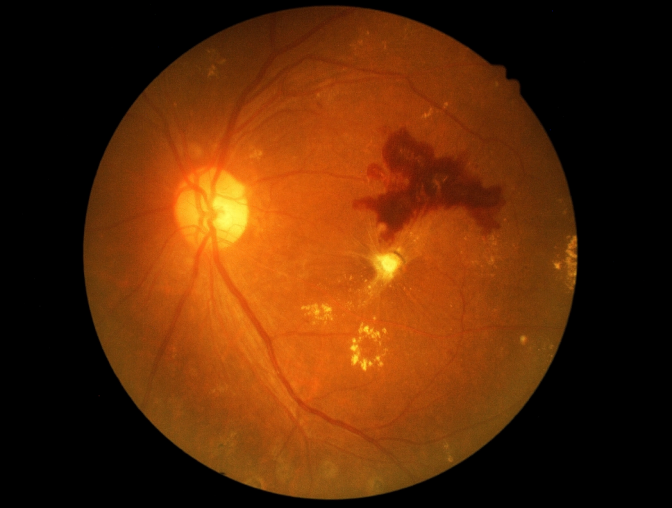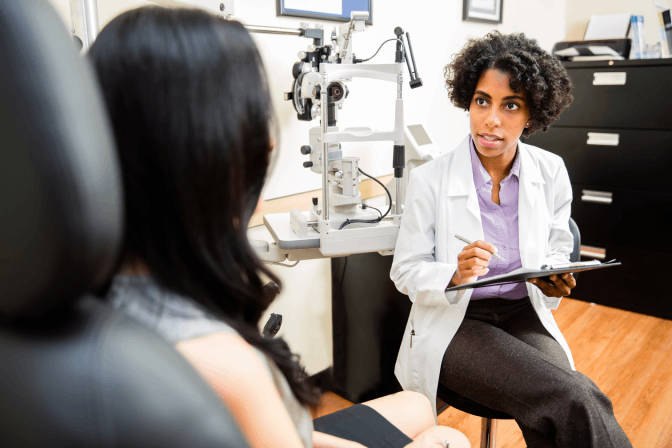50% OFF a Complete Pair of Glasses
*Restrictions apply. Click here for details.
Diabetic Retinopathy Screening & Treatments at Clarkson Eyecare
Diabetic retinopathy is an eye condition that damages the retina in people with diabetes. The longer you have lived with diabetes, the more likely it is that you will experience complications from the disease. The retina is a light sensitive structure inside the eye that is necessary for sight. When light enters through your eye, the image from your field of vision appears on the retina. The retina transmits these light signals through the optic nerve to the brain, which then translates these signals into visuals that your brain can understand.
A network of tiny blood vessels keeps the retina healthy and functioning. When a person with diabetes has unmanaged blood pressure or blood sugar levels, damage may be caused to the small blood vessels throughout the body, including the structures inside the eye. This damage may cause decreased blood flow to the retina and fluid leakage into the eye, leading to vision loss. In some cases, abnormal blood vessels may begin to form within the eye, which can cause scar tissue to form, causing vision impairment and even blindness.
What Are Symptoms of Diabetic Retinopathy?

At first, people who develop diabetic retinopathy may not notice any vision changes because the symptoms are silent in the condition's early stages. When diabetic retinopathy becomes more advanced, it may affect vision in a number of ways:
Your vision may appear blurry
You may notice floaters in your field of vision
Your night vision may worsen, or you may begin to see colors less vividly
You may see dark spots or unexpected blank areas within your field of vision
If you have diabetes and notice any of these vision problems, call your eye doctor for an appointment to assess your eye health.
How Do Eye Doctors Diagnose Diabetic Retinopathy?

During a comprehensive exam, an eye doctor will assess your retinal health. The doctor will begin by dilating your pupils using special eye drops to allow them to examine the inner structures of your eyes more easily.
In addition, the doctor will likely administer a test known as optical coherence tomography, which takes images of the retina to assess its thickness for signs of diabetic retinopathy.
A fluorescein angiography may be performed as well, which helps the eye doctor view the tiny blood vessels within your eye. Dye is injected into your arm during this procedure, which travels through blood vessels and reaches your eyes. The dye appears bright yellow, allowing the eye doctor to see the blood vessels in your retina. Using a specialized camera, the doctor captures images of these blood vessels to evaluate for abnormal activity that indicates the presence of diabetic retinopathy.
How Do Doctors Treat Diabetic Retinopathy?

In early stages of the eye disease, managing your diabetes may be enough to control the progression of diabetic retinopathy. Scheduling frequent dilated eye exams with an eye doctor is important to keep track of the eye condition.
When the disease begins to affect your vision, more advanced diabetic retinopathy treatment may be necessary to preserve your remaining vision. Some patients receive a medication known as anti-VEGF therapy, which is injected into the eye after it has been numbed and stops blood vessels from leaking into the retina. Laser treatments are another treatment option that can seal leaky blood vessels and minimize the development of abnormal blood vessels in the retina. If scar tissue or blood has built up inside the eye, surgery may be required to remove the blockages and restore vision.
How Can People with Diabetes Prevent Diabetic Retinopathy?

If you are diabetic, it is critical to take any prescribed medications from your doctor to help keep your blood sugar levels in a healthy range. Schedule a comprehensive exam with your eye doctor at least once a year to reevaluate your eye health, which can help them catch signs of diabetic retinopathy early.
Good nutrition and regular physical activity are good preventative measures to help keep your blood sugar levels in a healthy range. Maintain a healthy diet and exercise regularly to lower your risk of diabetic retinopathy or to prevent existing retinopathy from progressing.
Diabetic retinopathy can lead to vision impairment or even blindness. However, the complications of diabetic retinopathy can be prevented with self-care and an eye doctor's supervision.
